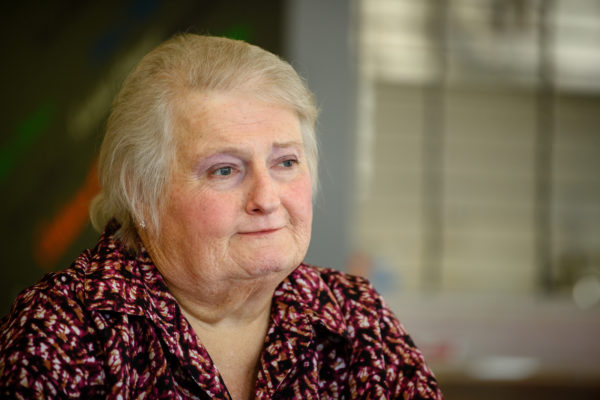Standing on the precipice of the first-ever transgender-specific case to face the Supreme Court of the United States, it'd be understandable if plaintiff Aimee Stephens, 58, seemed nervous or distraught ahead of the Oct. 8 date to hear arguments. But resolute is the best word to describe Stephens' demeanor when she met with Between The Lines to discuss her case — one that could change the fate of LGBTQ equality for better or worse.
"I take each day as it comes — especially now in light of present health conditions," she said. "… And we try to live each day as if there's not anymore."
Today, despite undergoing dialysis and struggling with breathing problems, Stephens is unwavering in the now six-year battle with her former employer R.G. and G.R. Harris Funeral Homes in Garden City. The trouble began when Stephens was fired after coming out as a woman to Thomas Rost, the funeral home's owner, after a six-year employment history.
Rost said that keeping Stephens on would run contrary to his religious beliefs and would hinder grieving families from "processing grief" because Stephens wouldn't be able to follow the "professional, sex-specific dress code," despite her promises to come in from then on in professional women's work attire. Rost also held concerns about her sharing the "single-sex restroom" with other women.
After her termination, Stephens filed a complaint with the U.S. Equal Employment Opportunity Commission and sued her former employer. Initially losing her case, Stephens' team appealed and eventually, a federal judge at the 6th Circuit Court of Appeals ruled that the funeral home engaged in sex discrimination against Stephens when they fired her. Now, after an appeal from the case's defendants, the American Civil Liberties Union is representing Stephens on her way to the Supreme Court. Should the court rule in her favor, Stephens' case could expand Title VII of the Civil Rights Act of 1964 to definitively include protections for sexual orientation and gender identity. However, an opposing decision would mean far more rigid interpretations of the existing law that would exclude thousands in the LGBTQ community.

"I didn't give up."
Though it might have seemed like an overnight decision to her former employer, Stephens certainly didn't take coming out lightly. Since childhood she had struggled with gender dysphoria and only as an adult did she start to embrace the fact that she might not identify with the gender assigned to her at birth. Roughly 10 years ago, she sought out a therapist who advised her to stop suppressing her feelings and to take steps to venture out in the world as her true identity. Even after coming out to her wife and receiving a positive reaction, Stephens was still conflicted: she was living a double life at home and at work and it was making life unbearable.
"In 2012 I came close to ending it all. I couldn't take it anymore. Living two lives was tearing me apart," Stephens said. "And if I couldn't go forward, and I definitely couldn't go backwards, then what was the point? So, I stood in the backyard with a gun to my chest for an hour, but I couldn't do it. I realized I liked living too much [and] who I could become. And in that moment I chose life."
Since then, Stephens said that she has two missions in life: to live both her own truth and to "make every moment count."
"It's important for people to know that about me, that I didn't give up," she said.
Shortly after choosing to live openly as a woman, at the advice of her therapist, Stephens began drafting an official coming out letter to distribute among friends, family and her boss.
"There were a lot of drafts of that letter, but the final letter came out and I thought that it pretty well explained what was going on and what I needed to do in order to keep my own sanity," she said.
Unfortunately, Rost's reaction was Stephens' worst-case scenario. He fired her and offered her a three-month severance package. Had she taken that offer, she also would have signed away her right to sue Rost.
"And the offer he was making — once I read through it, talked to my wife, I really got angry. I felt I had been done wrong, but when you offer a severance package for something that they did, basically, deep down, that tells me he knew he was wrong," she said. "And then with what he was asking me to do, I couldn't go through with it. So, I did the only other thing I knew to do and that was contact an attorney."
Meeting Opposition
Rost is represented by the conservative Christian group Alliance Defending Freedom. Since 1994, the group has inserted itself into many cases involving LGBTQ people across the country and cited religious freedom as a defense against their inclusion. Regarding the transgender community, the group has often used transgender-affirming school bathrooms as a means to promote false ideas about the transgender community. In this case, it argues that Stephens is attempting to redefine the original meaning of sex in Title VII and that its repercussions will be a danger to the public.
"Federal courts should not usurp Congress's authority by judicially amending the word 'sex' in federal nondiscrimination law to include 'transgender status,'" ADF wrote in its legal brief. "Redefining sex discrimination will cause problems in employment law, reduce bodily-privacy protections for everyone and erode equal opportunities for women and girls, among many other consequences. Congress, not the courts, is the institution best positioned to balance those considerations."
However, American Civil Liberties Union of Michigan Staff Attorney Jay Kaplan said that he feels that this is a case of "gender stereotypes," and that even a conservative reading of the law's text should find that Stephens' termination fell within the parameters of sex discrimination.

ACLU of Michigan Staff Attorney Jay Kaplan.
"They're trying to argue in the legal briefs right now that it's all about dress code and there are many reasons that [Rost] indicated where he couldn't accept the fact that Aimee was a transgender woman. He cited his religious beliefs, he cited that he just felt that things are a certain way and those are gender stereotypes," Kaplan said. "Sex discrimination means because of sex. Aimee was fired because of sex. Being a transgender woman, that's related: someone who identifies with a different sex than what was assigned at birth. It's in the definition, and I do think we have a strong textualist argument." Kaplan also pointed to the fact that federal courts have already expanded the meaning of sex since the original 1964 law was put in place.
"… And the court has interpreted Title XII, they've said it applies to gender stereotypes, they've said it applies to sexual harassment, even to same-sex employees," he said. "So, they've [already] expanded in terms of what people might have thought it was in 1964."
For her part, Stephens said that many of the arguments around the country surrounding transgender issues come from ignorance about transgender people.
"I think it's hard to just make assumptions about how a person is or who they are. I think you need to sit down and talk with the person and find out what they're about, why they believe the way they are. And it's only then that you come to a better understanding," she said. "In my interviews that I've done, that's a point I strive toward: to let people find out who I am, what I've been through and my choices in life."
Hope Resonates
Perhaps it's her positive attitude that's helped Stephens' case gain the attention of not only legal entities around the country but other public figures as well. Like last week at the Primetime Emmy Awards when openly transgender actress and activist Laverne Cox carried a rainbow clutch with the words "Oct 8, Title VII, Supreme Court" printed on it over a rainbow background. The ACLU also got the support of actors like Jesse Tyler Ferguson, Alan Cumming, Peppermint and Mishel Prada to read Stephens' coming out letter to Rost. Stephens said she is glad to share her story because it's important for awareness of transgender issues to spread.
"I think it's important that we as a society and as individuals need to share our story. We need to be willing to share it, be willing to talk about it. And I think that's where a lot of our problems come in — especially in the LGBT community. When we make up our minds that we want to share the story, there always appears people on the horizon that don't want to hear it," she said. "And their only response that they know of is to tear you down and run away. But how do you get them to put the shoe on the other foot and put them in that situation? Because I think if you could do that, the explaining would be a lot easier."
When asked if she has any advice for transgender people across the U.S. who are thinking of coming out at work she gave them a message of hope.
"I would certainly hope that they have better [results] than I did. I guess the question would be, 'Would I encourage with them to go through with it or not go through with it?' And even with what's happened with me I'd go through it all over again. It was that important to me," Stephens said. "So, I would say to that person, 'Be prepared. You're liable to lose a few things. You're liable to lose some friends, some family — I know I did. I had an aunt who disowned me, but who has since come back and said she better understands now. So, do what you have to do to survive. Even if it means losing some things that you thought were really important. Your own sanity, your own life is what's important.'"










